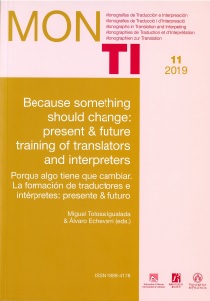Because something should change. Translator and interpreter training: Past, present and future
Main Article Content
Abstract
Downloads
Article Details
The documents contained in these directories are included by the contributing authors as a means to ensure timely dissemination of scholarly and technical work on a non-commercial basis. It is understood that all persons copying this information will adhere to the terms and constraints invoked by each author's copyright. These works may not be reposted without the explicit permission of the copyright holder.
References
Baigorri, Jesús. (2000) La interpretación de conferencias: el nacimiento de una profesión, de París a Núremberg. Granada: Comares
Barr, Robert & John Tagg. (1995) “From teaching to learning: A new paradigm for undergraduate education.” Change 27:6, pp. 12-25
Bernardini, Silvia. (2004) “The theory behind the practice: Translator training or translator education?” In: Malmkjaer, Kirsten (ed.) 2004. Translation in undergraduate degree programmes. Amsterdam & Philadelphia: John Benjamins, pp. 17-29
Bresciani, Marilee. (2016) “Introduction: Rethinking how we design, deliver, and evaluate higher education.” In: Bresciani, Marilee (ed.) 2016. The neuroscience of learning and development: enhancing creativity, compassion, critical thinking, and peace in higher education. Sterling (VA): Stylus Publishing/ACPA, pp. 1-26
Delisle, Jean. (1980) L’analyse du discours comme méthode de traduction. Ottawa: Presses Universitaires d’Ottawa
Gambier, Yves. (2012) “Teaching Translation/Training Translators.” In: Gambier, Yves & Luc van Doorslaer (eds.) 2012. Handbook of Translation Studies 3. Amsterdam & Philadelphia: John Benjamins, pp. 163-171
Gambier, Yves. (2014) “Changing landscape in translation.” International Journal of Society, Culture & Language 2:2, pp. 1-12
Gile, Daniel. (1994) “Opening up in Interpretation Studies.” In: Snell-Hornby, Mary, Franz Pöchhacker & Klaus Kaindl (eds.) 1994. Translation Studies: An interdiscipline. Amsterdam & Philadelphia: John Benjamins, pp. 149-158
Gile, Daniel. (1995) Regards sur la Recherche en Interprétation Simultanée. Lille: Presses Universitaires de Lille
Gile, Daniel. (2017) “Traditions and innovation in Interpreting Studies: a personal analysis for 2016.” Domínios de Lingu@gem 11: 5, pp. 1424-1439
Hurtado Albir, Amparo. (1996) “La enseñanza de la traducción directa ‘general’. Objetivos de aprendizaje y metodología.” In: Hurtado Albir, Amparo (coord.) 1996. La enseñanza de la traducción. Castelló de La Plana: Servei de Publicacions de la Universitat Jaume I, pp. 31-56
Hurtado Albir, Amparo. (dir.) (1999) Enseñar a traducir. Metodología en la formación de traductores e intépretes. Madrid: Edelsa
Hurtado Albir, Amparo. (2008) “Compétence en traduction et formation par compétences.” TTR: Traduction, Terminologie, Rédaction 21:1, pp. 17-64
Kelly, Dorothy. (2005) A Handbook for Translator Trainers. Manchester: St. Jerome. Kiraly, Donald. (2000) A Social Constructivist Approach to Translator Education. Manchester: St. Jerome
Krings, Hans P. (1986) “Translation problems and translation strategies of advanced German learners of French (L2).” In: House, Juliane & Shoshana Blum-Kulka (dirs.) 1986. Interlingual and intercultural communication. Tübingen: Gunter Narr, pp. 263-275
Lakatos, Imre. (1978) The methodology of scientific research programmes. Cambridge: Cambridge University Press
Lörscher, Wolfgang. (1991) Translation performance, translation process, and translation strategies: A psycholinguisitic investigation. Tübingen: Gunter Narr
Morin, Edgar. (2005) Introduction à la pensée complexe. Paris: Éditions du Seuil
Pöchhacker, Franz. (2016) Introducing Interpreting Studies. London & New York: Routledge
Prensky, Marc. (2001) “Digital Natives, Digitale Inmigrants. Part 1.” On the Horizon 9:5, pp. 1-6
Pym, Anthony. (2003) “Redefining translation competence in an electronic age.” Meta 48:4, pp. 481-497
Roberts, Roda. (1984) “Compétence du nouveau diplômé en traduction, traduction et qualité de langue.” In: Actes du Colloque, Société des Traducteurs du Québec/Conseil de la langue française. Québec: Éditeur officiel du Québec, pp. 172-184
Sandrelli, Annalisa. (2016) “Becoming an interpreter: The role of computer technology.” MonTI Special Issue 2, pp. 111-138
Toury, Gideon. (1995) Descriptive translation studies - and beyond. Amsterdam & Philadelphia: John Benjamins
Widdowson, Henry. (1984) Explorations in applied linguistics 2. Oxford: Oxford University Press
Wilss, Wolfram. (1996) Knowledge and skills in translator behavior. Amsterdam & Philadelphia: John Benjamins


